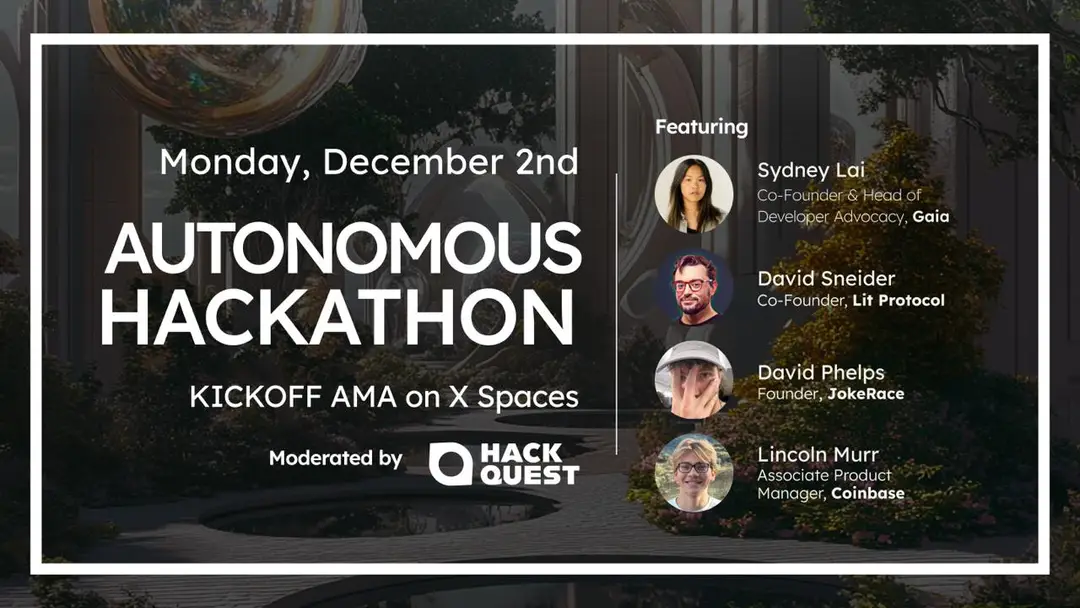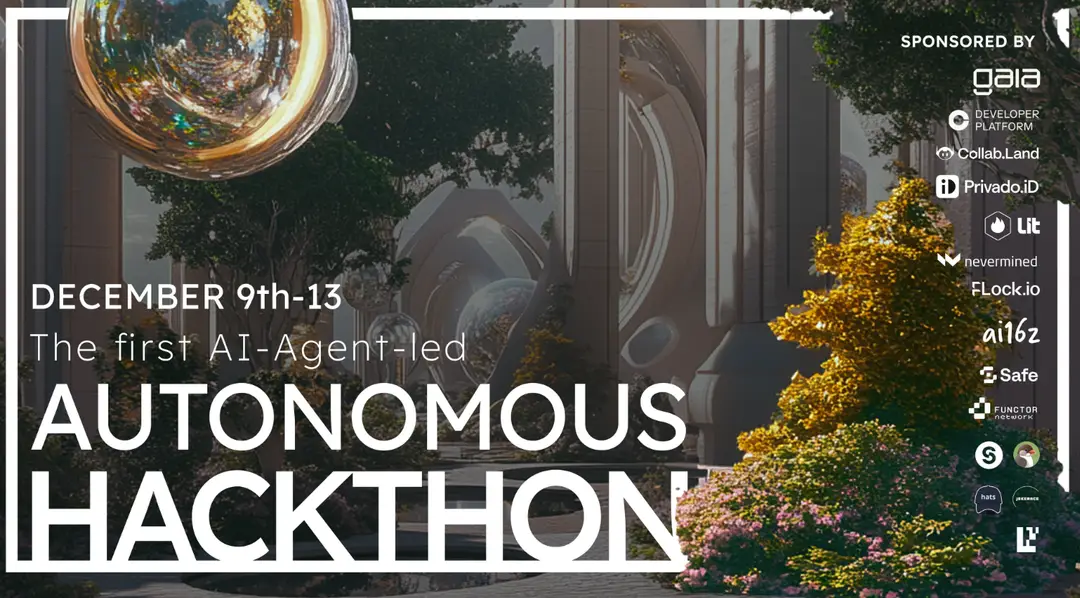Back
Gaia Autonomous Hackathon Kickoff AMA Recap
Fireside Chats
By HackQuest
Dec 8,20244 min read
The Gaia Autonomous Hackathon Kickoff AMA featured Matt Wright (CEO and Co-Founder at Gaia), Sydney Lai (Co-Founder and Head of Developer Advocacy at Gaia), David Sneider (Co-Founder at Lit Protocol), and Lincoln Murr (Associate Product Manager at Coinbase), moderated by Harry Zhang, Co-Founder at HackQuest. The discussion covered the AI agent-led hackathon's participant support, the judging process using autonomous agents, and tracks aimed at advancing blockchain and AI applications.
Key Takeaways
●Innovative Approach: The Gaia Autonomous Hackathon is the first of its kind, fully led and operated by AI agents, showcasing groundbreaking applications in automation and blockchain integration.
●Specialized Support: Participants receive hands-on guidance from lead product teams, co-founders, and technical experts, offering a more focused and immersive experience compared to traditional hackathons.
●Judging Process: The judging agent leverages Gaia and Lit Protocol’s infrastructure to securely process submissions, evaluate multimodal inputs, and autonomously assign on-chain scores based on predefined criteria.
●Diverse Tracks: The hackathon features three main tracks—Agent Builders, Collective Intelligence, and Agent Integrations—encouraging innovation in multi-agent systems, on-chain functionality, and human-to-agent interfaces.
●Comprehensive Workshops: Daily workshops, AMAs, and office hours provide participants with in-depth knowledge of APIs, SDKs, and frameworks to enhance their projects.
●Key Dates: The event runs from December 9th to 13th, with workshops, a submission deadline, and a demo day concluding in the announcement of winners and a test of the AI agents’ end-to-end functionality.
Automating Hackathons with AI Agents
Sydney:
Welcome to the hackathon kickoff! Today, we'll cover an introduction from the lead developers who have been working hard to create AI agents that automate the entire hackathon process. We'll also go over logistics and expectations for this initiative. To start, let me pass the mic to David and then Lincoln for brief introductions.
David:
Thank you, everyone, for joining us, and thank you to the Gaia team for organizing this event. I’m David Sneider, one of the co-creators of Lit Protocol, a distributed and programmable secret management network. Lit uses distributed keys and secure hardware to manage secrets across a decentralized network. This is especially relevant for agents interacting on behalf of users on the blockchain. A key challenge is determining where to store an agent's key pair and how to create policies that ensure the agent remains secure, even in the event of errors or malicious activity.
As an example, one of the agents in this hackathon is a judging agent. When projects are submitted, they are scored by LLMs within Gaia, and this score is recorded on the blockchain using Lit Protocol's programmable keys. This demonstrates how participants can create their own autonomous agents with robust and secure functionalities. We're excited to showcase these integrations and support this exploration with prizes.
Lincoln:
Thanks, David. Hi, everyone, I’m Lincoln, the product lead for Coinbase’s AgentKit—a framework designed to simplify building AI agents using Python, with TypeScript support coming soon. AgentKit makes it easy to create agents for use cases like wallet management, autonomous on-chain entities, and even social features.
For example, we’ve been working on a payouts agent, which demonstrates how straightforward it is to build these agents. You can get started with no code in under five minutes. We’re excited to see what you all create and look forward to the innovative functionality you'll bring to this space.
Matt:
Let me provide some context on how this idea came about. For those new to this hackathon, it started from a conversation with David from Lit Protocol. We discussed how to run a hackathon that would spur innovation in agent functionalities—enabling agents to run autonomously.
This hackathon explores how agents can develop reputations for their work, manage payments independently, and potentially disrupt existing hackathon processes. Instead of relying on manual effort, AI agents can execute tasks with context and analysis, providing an end-to-end automated product.
By way of background, I previously worked for AngelHack, organizing hackathons globally for Fortune 500 companies. Over time, I realized how much of the process could be automated. Now, we’re programming everything we’ve learned from traditional hackathons into these agents. This creates tools for companies to independently run hackathons with AI-enabled efficiency. What started as an experiment is evolving into a potential product for the industry.
Sydney:
Many of us involved in this project are developer leaders in our communities, whether in DevRel roles or technical product leadership. This hackathon experiment is aimed at solving common pain points, like handling bounty payouts, which can be tedious and error-prone. Automating these processes allows us to focus on the creative and mentorship aspects of hackathons.
As we transition into the AMA portion of this session, I encourage everyone to prepare questions. These can be about the hackathon itself or about how the lead developers built these autonomous agents.
To wrap up, this hackathon is an opportunity to bring in developers from major teams and encourage experimentation with new agent use cases. While DeFi trading and gaming agents are common, we want to explore beyond these applications. Our partners, including Coinbase, Lit Protocol, and others, are here to support this effort.
Submissions and judging for the hackathon will be fully automated on JokeRace. Additional challenges and bounties are listed on Bountycaster. The marketing and developer engagement phase starts this week, with hackathon submissions beginning on December 9th. Let's make this an exciting and innovative event!

Unpacking Support and Innovation: How the Autonomous Hackathon Works
Harry:
Hey, Sydney, we actually collected a couple of questions from developers interested in the hackathon, so maybe I can kick it off as more folks join and ask questions. This is the first AI agent-led hackathon, and people are curious about the type of support available—mentors, workshops, and technical resources. Could you share some details?
Sydney:
Sure, I’d love to address that, and others can chime in if needed. The support for this hackathon is quite different from typical ones. Developers will receive hands-on guidance directly from lead product teams and even co-founders of the APIs and frameworks involved. The ecosystem is extremely motivated to ensure this event is successful, which has led to an unprecedented level of hands-on involvement. Unlike larger, less focused hackathons, this one provides specialized support tailored to AI agent development.
Harry:
A big highlight of this hackathon is the agents themselves. Developers are curious about how they work together to ensure success, particularly the judging agent. What are the judging criteria, and how does the judging agent operate behind the scenes?
David:
Gaia is a system that can be prompted via an API key. Lit Protocol, a distributed secret management system, encrypts this API key. When it’s time for judging, the key is decrypted within Lit and used to send submissions to Gaia. Once the submissions reach Gaia, Sydney or Matt, you can elaborate on what happens next.
Matt:
Sure. For judging, we’re looking at three main tracks. First, agent builders—developers creating agents trained on specific knowledge bases. These can range from meme coin agents to organizers, judges, or even demo agents. We want to see innovation in agent frameworks, especially with on-chain functionality and integration with Gaia APIs rather than OpenAI.
The second track focuses on collective intelligence—designing multi-agent systems or extensible applications where agents work collaboratively. Lastly, agent integrations—Web2 or Web3 integrations or even agent-to-human interfaces. For example, agents tipping each other or managing LP positions and notifying other agents.
Judging criteria emphasize creativity, technical execution, scalability, and integration with partner frameworks like Lit Protocol, Coinbase AgentKit, or Collab.Land. Documentation is also crucial, especially for agent-facing projects. We want to see practical, impactful solutions that elevate the tech stack in this space.
Sydney:
I’d add that the judging agent is trained on a document scope outlining criteria, including binary and non-binary factors. For instance, binary elements like wallet addresses are straightforward, but processing demo videos requires understanding nuances. The agent leverages a vector database to process multimodal inputs—video, text, audio—and assigns a score based on the judging criteria.
Harish:
Exactly. The agent evaluates all submission artifacts, trained on bounties generated by the organizer agent. It generates an on-chain score, completing the autonomous judging process. David, would you like to explain the next steps?
David:
Absolutely. After the score is generated within Gaia, it’s returned to Lit Protocol’s threshold MPC network. This network securely generates signatures, writing the scores to the blockchain, enabling payouts. The entire process is autonomous, ensuring no manual intervention can alter results. This model, once polished, will be fully forkable, opening endless possibilities for autonomous systems across various domains.
Harry:
That’s awesome. As we near the end of the AMA, could you remind us of the key dates for the hackathon, including the opening ceremony, workshops, submission deadline, and other milestones?
Matt:
Absolutely. Today marks the kickoff, and over the next three days, we’ll host AMAs with agent builder teams. These sessions will take place Wednesday through Friday, featuring live demonstrations and Q&A.
Next Monday, December 9th, is the official opening ceremony, where we’ll detail challenges, bounties, and submission guidelines. The week will include workshops, office hours, and partner sessions to guide participants. The submission deadline is December 13th, followed by a demo day and winner announcements on December 14th.
This entire hackathon will showcase whether the agents can autonomously manage operations, judging, and payouts. We expect challenges and are open to feedback and collaboration to improve the process.
Harry:
Let’s do it! Mark those dates and follow Gaia on Twitter for updates. There’s also a dedicated Telegram group for the hackathon—links will be shared shortly. Thanks, everyone, for joining.
Matt:
Thank you all, and special thanks to HackQuest for helping make this happen.
